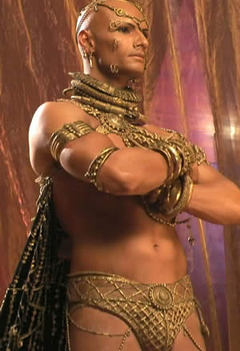Things need not have happened to be true. Tales and dreams are the shadow-truths that will endure when mere facts are dust and ashes, and forgot.
-Dream, in Neil Gaiman’s SANDMAN #19: "A Midsummer Night’s Dream"
[Spoiler Alert: If you’re looking forward to seeing 300 for the first time, you may not want to read any of what follows. If however, you’re reluctant to go because the trailers make it look like a bit of a freak show, then this post may change your mind.]
Read a lot of reviews about 300 before seeing it a week ago, many of them rather foolish. Frank Miller, writer of the graphic novel, is on record as saying that he was trying to mythologize the battle, rather than retell it in a historically-accurate manner. On that basis, it seems a bit besides the point to complain about historical inaccuracies, gargantuan rhinos and Persians by the way of Mordor.
And yet, when I first saw the movie a week ago, my feelings were mixed. Sure, there were a lot of great images and battle sequences, but the rational mind still couldn’t help but get in the way. What ABOUT all of those historical inaccuracies, gargantuan rhinos and Persians straight out of the land of Mordor?
My reaction was quite different upon a second viewing last night. Because it was then that it sunk in more clearly that the events were being narrated by a one-eyed man in front of a campfire. The narrator is Dilios, the sole Spartan survivor of the battle. King Leonidas has chosen him to return to Sparta as a messenger of the battle’s outcome – not because of any ocular injury, but because Dilios is blessed with a gift with words that is almost unique among his people. (Spartans were so well-known for their curt manner of speech that our word "laconic" is derived from the geographical part of the Peloponnese in which the Spartans lived.)
By the film’s conclusion, the last piece of the puzzle falls into place. The entire movie is nothing more than Dilios’ speech before the Battle of Plataea. So what we, the audience, have just witnessed for the last few hours is not a literal account, but Miller’s attempt to imagine how a Greek storyteller, circa 479 B.C., would have told it. It’s a fish story, a tall tale, a wildly-exaggerated war story. As Greek myths usually are.
No self-respecting Greek storyteller would ever tell of a hero-king who as a boy once killed a mangy wolf half-starved with hunger and injured from being driven away from its pack by the others. No, it’s got to be 8 feet long, with fangs of black steel and eyes that glow like hot coals. That’s the way myths work.
Whether it actually happened or not is completely irrelevant. What matters is that it’s an allegory that foreshadows the main event that follows. Storytellers love that kind of stuff. Even baby Hercules got his start by strangling Hera’s serpents in his crib.
Likewise, the priests responsible for not giving the hero-king the aid he needed can’t be otherwise decent, ordinary clerics. No, they’ve got to be grotesque, misshapen mutants from the Forbidden Zone, who satisfy their obscene desires with the beautiful, drugged-out maidens entrusted to their care. Moreover, their opposition couldn’t have been because of an honest, yet benighted, zeal for religious law and custom. No, they were black-hearted traitors – in the pay of the Great King himself!
I could go on. The movie’s name should have been 1000, since 700 Thespians (not actors, but inhabitants of the democratic town of Thespia) were present. But our Spartan storyteller can’t resist the urge to claim the glory – ALL the glory – for his fallen comrades. In fairness, a Thespian bard might have jealously done the same. Because to the ancient Greeks, winning eternal glory for one’s name was everything. Rally round boys, and dream of the fame you may win in the battle to come! If you’re lucky, you might meet and kill a strange behemoth from a foreign land. Don’t think it can’t be done. Why, didn’t I tell you that one of the brave 300 even felled a gargantuan rhino (remember that improbable creature?) with a single throw of his spear?
The enemy’s number is vast. They’re fearsome, but not immortal. At their head is the Great King, who commands and ensorcells them with his spell-binding voice, which is almost supernaturally compelling. He’s more than a man – 10 feet tall – I saw him myself.* But he may also be…LESS than a man, if you know what I mean.
You may have heard before that he fancies himself a god. Funny thing though. He bleeds just like the rest of us.
* Our Spartan storyteller of course exaggerates much, though it’s not clear if he’s even aware of it.
I experienced a similar phenomenon once several years ago, while driving through a rural area at 55 mph late at night. In the darkness, a huge ghostly grey wolf, or giant dog, suddenly appeared in my headlights. Its eyes glowed, though my 20th Century mind knew that was merely because the light was reflecting from the back of its retinas.
There was no time to react. To my horror, it was run down instantly with a sickening thud. There was nothing I could have done. Pulling off the road, I weighed the possibilities. If it was a wolf, I had just killed an animal that was endangered or threatened in the part of the country I was in. On the other hand, if it was a dog, then I had probably killed some farmer’s poor animal. (Sorry environmentalists, but the thought that I might have killed some child’s beloved pet is what distressed me the most.)
Fetching a flashlight from the glove compartment, I walked up and down the section of road I had just traveled. But the carcass of no wolf or great dane could I find. In its stead was only the bloody, lifeless body of a small red fox.
My imagination, in that split-second in the car, had inflated a puny little fox into a huge, preternatural wolf. So it doesn’t surprise me that that in the frenzy of combat – with spears stabbing, weapons slashing – that a Spartan fearing for his life might perceive an attacker as a needle-toothed goblin instead of an ordinary, all-too human, man.
POSTSCRIPT: It was telling that during one of the final scenes, when the Persians have surrounded the brave 300, and are drawing their lethal arrows upon them, that a Taiwanese sitting beside me blurted out, "Zhong guo ren" (The Chinese).
UPDATE (May 30/07): On the subject of fish stories, I was recently reminded of "The War of the Simpsons," episode, which concludes when a bait shop owner is asked if anyone has ever caught a giant local catfish nicknamed "General Sherman":
Well, one fella came close. Went by the name of Homer. Seven feet tall he was, with arms like tree trunks. And his eyes were like steel, cold and hard. Had a shock of hair – red. Like the fires of Hell.


(Images from Filmthreat.studiostore.com and Devir.com)
i-2